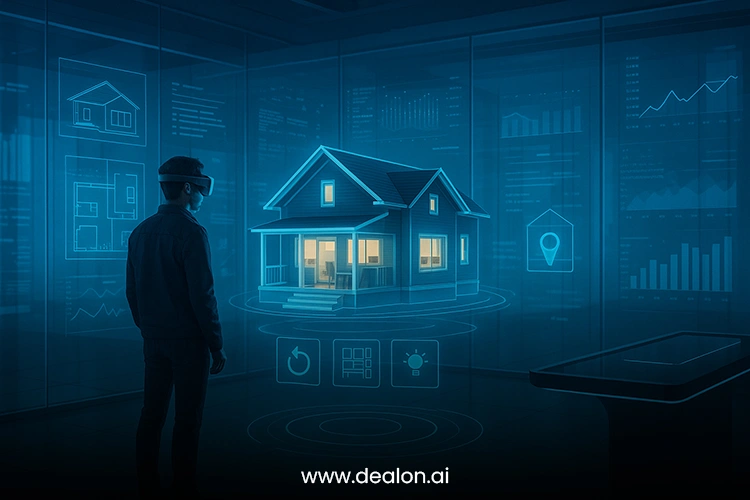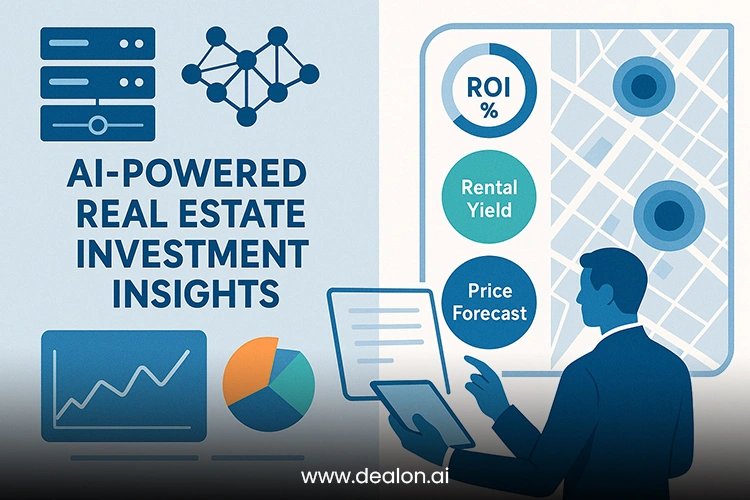As real estate adjusts to the digital world, AI makes buying, selling, and experiencing real estate differently. Every aspect of buying, selling, and managing property is upgraded thanks to AI. Thanks to these advances, customers get better service, and real estate experts have more helpful information for decision-making.
In previous years, people sold and bought property mainly by looking at homes in person and reading stationary ads. Moreover, AI allows potential buyers and sellers to look at properties without presence, using virtual reality (VR), augmented reality (AR), and technology-based staging. A virtual tour allows potential buyers to look at homes wherever they are, simplifying finding the shortlist for their visits.
At the same time, AI is changing how market analysis is done. Using machine learning approaches, investors and agents can explore large datasets to see what is coming in the real estate market, which areas are on the rise, and value homes more accurately. Forecasting and tracking trends as they happen helps find the best time to invest and tailor advice to clients.
With changes in AI, it will be increasingly able to speed up transactions, increase property visibility, and improve how people invest. We’ll analyze in this post how AI improves virtual tours and provides deeper market analysis, revealing what’s coming for real estate in the future.
Also Read: AI in Agriculture: The Role of Drones and IoT for Smart Farming
AI in Real Estate: Transforming Property Management and Investment Strategies
Besides changes in property search and transactions, AI enhances how property is managed, and investments are made. AI tools can study information from buildings instantly, such as how much energy is being used, the planned maintenance schedule, and what tenants think, to run the building more efficiently and save money. AI relies on predictive analytics to find problems early, allowing staff to repair things before they become costly.
Using AI, investors can see essential trends happening in the property market. AI models can show how much investors might receive as rental income each year, review the growth of local communities and guess the future prices of properties, allowing them to decide wisely. Real estate investments and management can be smoother when routine routines like handling leases and rents are entrusted to AI.
AI is important in finding and evaluating new chances for investment. Using big data, AI helps discover upcoming trends, point out promising markets, and identify the properties that might give the best returns. Because of these insights, investors can find fast-growing areas and lower risks, making their investment in real estate more profitable and wise.
Since AI is consistently improving, it will increasingly help property management and investments, promoting better results, reducing costs, and leading to wiser choices in the industry.
The Rise of Virtual Property Tours: A New Era of Real Estate Viewing

In the past, buyers would have to go to multiple locations in person to find the home they wanted, which took a lot of time and cost. Virtual property tours allowed by AI have made looking at properties more efficient for buyers. Users can easily explore real estate from home using these virtual tours, which are convenient, fun, and inexpensive.
Using AI technology for virtual tours lets users enjoy an interactive experience as they look around virtual homes at their own pace. Visitors to your site can see each part of the house, pay attention to extra details, and change how the room is seen. Because of this, the buyer and the agent require much less time and effort to complete a property contract.
AI is also having an impact on virtual staging, which is rapidly changing the way properties are presented. AI can help a customer plan the appearance of a space by showing mock-ups of custom-chosen furniture, decor, and layouts. Giving buyers the option to try digital furniture lets them picture how the home could fit their lifestyle and encourages them to feel more comfortable and at home there. With AI-based augmented reality (AR), users can experiment with different wall colors and flooring choices and place furniture on the real estate site during the online visit.
AI-powered property viewing is helping customers find what they want more easily and making the entire process more pleasant which is beneficial for people buying homes practically anywhere. It brings a new way of viewing real estate, which is reshaping the buying and selling of houses and preparing the industry for greater progress.
AI-Driven Market Insights: Empowering Smarter Investment Decisions

Because the real estate sector is constantly changing, picking the best place to invest in was hard because it was hard to predict how the trends would change. Thus, the help of AI lets real estate experts find patterns and project future property prices using data which helps investors plan wisely.
With data from old sales records, current market trends, social media users’ opinions, and news, machine learning algorithms can estimate what the market will do and the future values of properties. AI helps investors and agents follow these variables as they happen and see the market’s overall direction, which supports their decision-making.
AI is very good at helping identify up-and-coming places and places with a lot of potential for growth in real estate. AI analyzes demographics, the economy, and infrastructure to use machine learning to find regions that will significantly increase property prices. Seeing which areas show strong profit potential allows investors to pick safer investment options in the long term.
In addition, AI helps spot undervalued properties that can give the highest earnings, offering real estate professionals an advantage. Thanks to processing complex market data, these AI tools find profitable chances to invest and speed up the necessary check-ups involved. As a result, investors can get higher returns and agents have more information to advise their clients.
AI-generated insights are changing how investors approach real estate markets since they can now see things that were previously hard to predict. Thanks to AI, real estate professionals can manage changes in the market, improve how they invest, and guide clients with outstanding support despite increased competition.
AI in Real Estate: Predictive Analytics for Optimal Pricing

Pricing a property in the real estate sector requires as much analysis. Appraising property used to involve the knowledge of appraisers, sales history records and the state of the market. These ways of making measurements were helpful, but errors or judgment calls were common in their results. With AI, analyzing property prices is more accurate, data-driven, and reliable.
AI looks at aspects other than just square footage and location to set property prices. They look at things like the age of the building, the layout with bedrooms included, the building’s energy rating, and check out the location, local highlights, closer transport options, and other essential neighborhood developments. To help create its predictions, the platform uses data about upcoming economic trends, trends locally, and mentions of the area seen on social media. This detailed process results in a more accurate estimate of property value since less margin for error is likely with the standard approach.
With AI, sellers have the confidence to set a listing price their buyers will find attractive. Using the latest market information, sellers can better set the price for their property to align with what buyers are looking for. Because of this, properties sell easily, and the company gains added benefits from competitive positioning.
The use of AI gives buyers the reassurance the price is fair. Using an algorithm means buyers can depend on accurate prices, not just on something they have heard or read about. Because there is no guesswork, both parties have complete information on which to base their choices and decisions.
Ultimately, AI-guided analytics transform the real estate industry by accurately predicting and establishing new levels of certainty for property values.
AI-Powered Chatbots and Virtual Assistants: Enhancing Customer Experience
Due to the fast speed of real estate, giving outstanding client service is necessary, yet handling client queries and prompt communication can often take a lot of time and effort. With the help of AI-based chatbots and virtual assistants, the way real estate agencies speak with clients has been changed. All day and night, these intelligent systems guide potential buyers, sellers, and renters by automating contact and ensuring they get the answers they seek.
Chatbots using AI are highly accurate in answering complex questions. Chatbots with NLP can process and comprehend detailed questions asked by users. For example, they can deliver a lot of property information, organize viewings, and recommend properties that match what the buyer likes, such as their preferred place, budget, and features. Because of this approach, they provide personal attention to every query, answer quickly, and reduce clients’ wait time, leading to greater contentment.
Artificial intelligence permits lending institutions to present the latest mortgage rates and suitable properties that meet a client’s requirements, making the decision easier for the client. Buying a big or small home is easier because these assistants consider users’ needs and budgets.
For real estate agents, AI chatbots help by taking on the simpler tasks and questions so that they can focus on bigger tasks. Improving efficiency and automated repetitive actions allows real estate agents to deliver better results with more customer attention. Using AI in virtual assistants helps clients interact easily and makes dealing with real estate more efficient and convenient.
The Future of AI in Real Estate: Endless Possibilities
There is a strong possibility that AI will change the real estate industry, as exciting new opportunities are ahead. The development of AI is leading to more advanced uses in real estate, which are changing how properties are handled in many ways. With advanced NLP and deep learning, property searches will be more precise, information about the market will become more detailed, and custom recommendations will help buyers and sellers.
AI that uses deep learning models can process large data sets and notice patterns that are hard for people to see. As a result, the AI can accurately forecast how the market will move, guiding real estate professionals to better decisions. AI, for example, uses knowledge of social changes, shifts in population, and behavior patterns to expect changes in demand, enabling it to act proactively on investment offers. These algorithms give investors insights into markets that help them choose the best properties and determine the correct prices.
With the new age of smart cities, AI will support all aspects of city development and managing properties. In these cities, data-based technology will simplify construction work and resource decision-making. Using AI, buildings will have better control over energy, traffic, and waste, which helps to make them more efficient and sustainable. AI will make identifying properties, setting prices and doing financial transactions through blockchain technology easier in smart cities.
Altogether, AI in real estate will help enhance the process with new approaches, transparency, and efficiency. Doing so much with data will guide decisions and allow the real estate market to react faster, be sustained, and unite communities.
Conclusion
AI changes how properties are seen, valued, bought, and sold. From showing real estate properties online with AI to value them and analyze the market, this helps improve each step in the real estate process. Thanks to these new technologies, the process becomes simpler for buyers and sellers and real estate experts get better resources for making decisions backed by data.
With artificial intelligence-based chatbots and assistants, customers can quickly get personal support, allowing agents to handle the more demanding jobs. Efficient property searches, improved understanding, and straightforward transactions will all result from deep learning and NLP.
AI will be important in creating smart cities by guiding city building, property management, and distribution of different resources. Evolving AI will only boost its presence in real estate, making processes more intelligent, sustainable, and transparent. AI drives real estate’s progress, making room for endless progress and efficient work.

